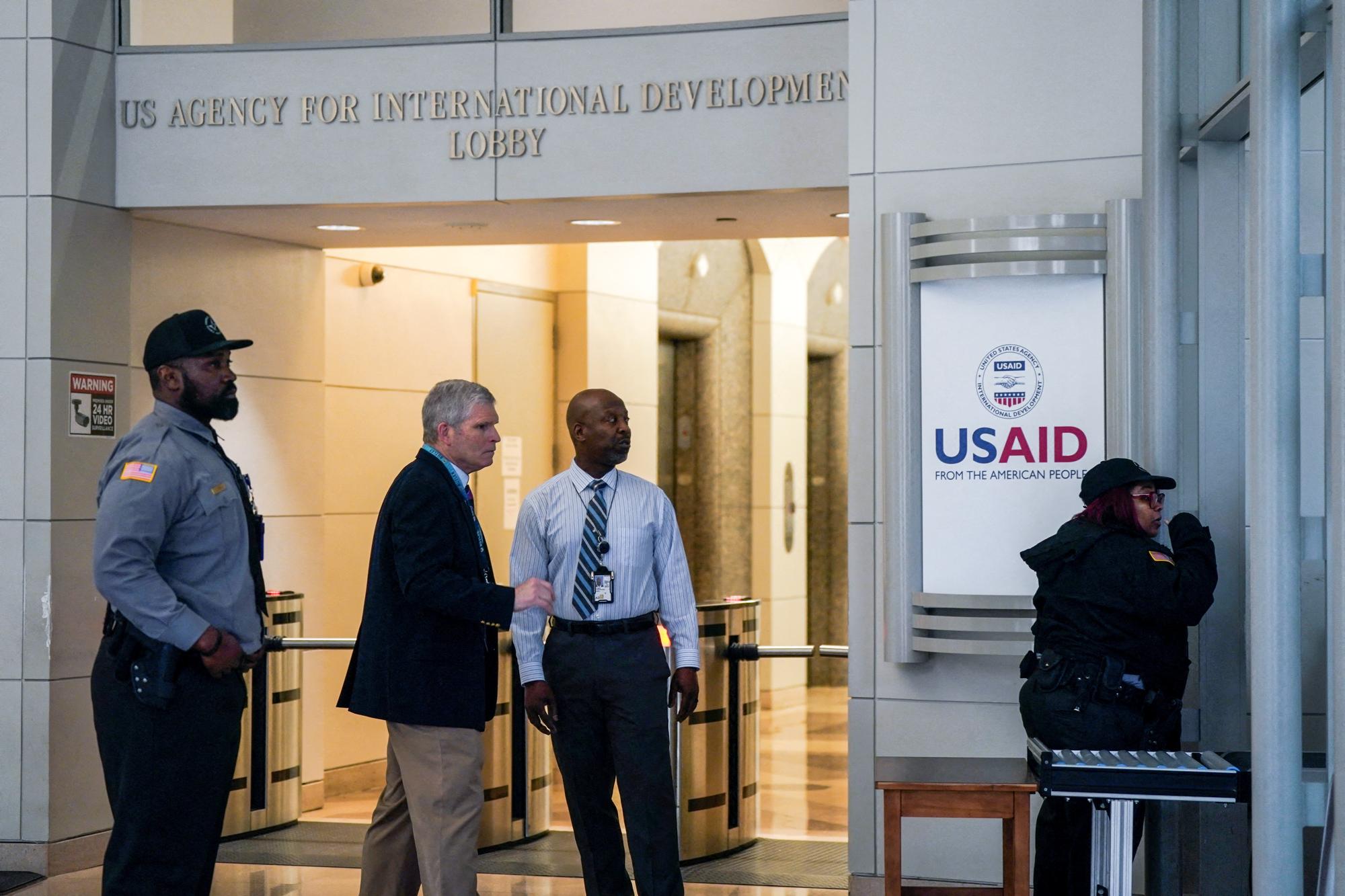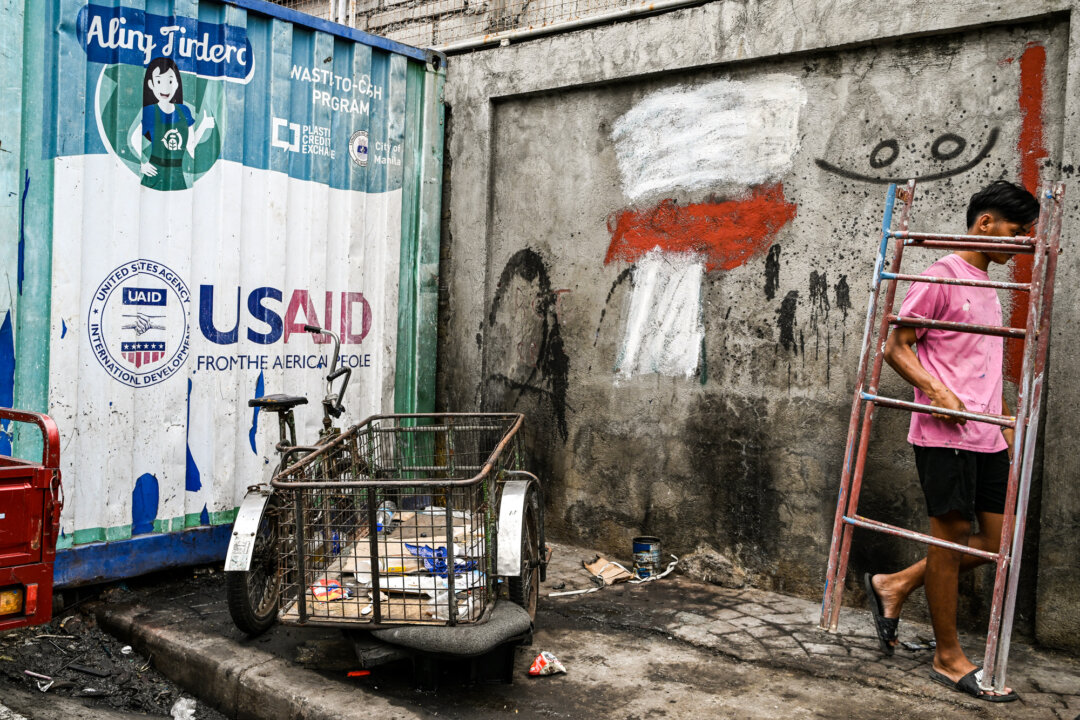The U.S. Agency for International Development (USAID) was a little-noticed federal agency until it suddenly became the object of a fierce political battle over the limits of presidential power and the accountability of government bureaucracies.
When the Trump administration closed the agency’s offices on Feb. 3 and later placed most employees on administrative leave, USAID took center stage in a drama unfolding at both ends of Pennsylvania Avenue.
On one side is the Trump administration’s ongoing effort to make all parts of the executive branch comply with the president’s agenda. On the other side are congressional Democrats, who are warning that the action is a dangerous abuse of executive power and are vowing to fight it.
Meanwhile, many observers fear that USAID’s true purpose—to advance U.S. interests through the use of soft power—may be overlooked.
On Feb. 3, President Donald Trump appointed Secretary of State Marco Rubio as acting director of USAID. The next day, the president indicated that the agency may be shuttered and its functions permanently transferred to the State Department.
Here is why critics want to abolish or reform the agency, supporters want to save it, and what may happen next.
Influence as Power
USAID was established by an executive order of President John F. Kennedy in 1961 to advance U.S. foreign policy by offering developing nations technical assistance, help with education and health care, and disaster relief.
The idea was that turning poor countries into stable world citizens would benefit U.S. citizens, too. A stable, prosperous nation makes a good ally, the theory went.
Champions of USAID continue to see it as both an essential tool for foreign policy and a tangible expression of the goodness and generosity of the U.S. people.
Most observers agree that the agency does some good. Relatively small by Washington’s standards, USAID employs about 10,000 people and controls an annual budget of about $50 billion.
In 2023, USAID poured $10.5 billion into humanitarian aid and $10.5 billion into health programs in countries around the world, according to the Congressional Research Service.
One program that is often touted as a shining success story is the U.S. President’s Emergency Plan for AIDS Relief, a USAID program that has provided more than $110 billion for controlling the spread of HIV/AIDS in more than 50 countries.

“Most estimates are that somewhere in the vicinity of 27 million people are alive today because President Bush initiated and Congress supported that program,” Scott Pegg, acting director of the Global and International Studies program and chair of political science at Indiana University–Indianapolis, told The Epoch Times.
President Donald Trump said in remarks to reporters on Feb. 4 that “some of the money is well spent.”
Yet the agency’s halo dims on closer inspection. Critics tell the story of an agency gone rogue, wasting millions of taxpayer dollars on inane programs, refusing to answer basic questions from congressional committees, and actively undermining the foreign policy goals of the United States.
Lost Purpose
The White House on Feb. 3. produced a list of projects funded by USAID that it characterized as examples of waste and abuse.
The projects include $1.5 million to “advance diversity equity and inclusion in Serbia’s workplaces and business communities,” another $47,000 for a “transgender opera” in Colombia, and $2.5 million for electric vehicles in Vietnam.
Rep. Wesley Hunt (R-Texas) listed further examples on social media platform X on Feb. 3, including $56 million to boost tourism in Egypt and Tunisia and $27 million for “reintegration gift bags” for deported Central Americans.
Hunt said the agency was behaving “like a child with YOUR credit card.”
Some USAID grant recipients include terrorist-controlled organizations, according to a study by the Middle East Forum released on Feb. 1.

The study found that $122 million has gone to groups aligned with designated terrorist organizations, including millions of dollars for organizations directly controlled by the Hamas terrorist group.
A July 2024 report from the U.S. Office of Inspector General noted deficiencies and vulnerabilities in USAID’s vetting process, which is supposed to prevent the diversion of U.S. funds to terrorist organizations.
In one case of apparent abuse, USAID partnered with Chemonics, an international consulting firm, to spend $9.5 billion to improve health supply chains. Chemonics allegedly overbilled the agency by up to $270 million and failed to meet its objectives, and the project led to 31 indictments for the illegal resale of USAID-funded materials, according to Sen. Joni Ernst (R-Iowa), who has called for an independent analysis of USAID grant recipients.

Ernst said USAID also provided nearly $1 million in funding to China’s Wuhan Institute of Virology, which the CIA has said was the most likely source of the virus that causes COVID-19.
USAID has resisted congressional oversight for decades, some lawmakers say, resulting in a culture of defiance.
“The agency has engaged in a demonstrated pattern of obstructionism,” Ernst wrote in a letter to Rubio on Feb. 4.
False claims were made that certain documents were classified to delay review by congressional staffers and to mislead Congress on the indirect cost of programs, Ernst wrote, adding that in some cases, this amounted to more than 25 percent of the grant total.
The agency refused to provide data on administrative costs, Ernst said. The agency later said that providing the data to Congress would violate federal law and that it had no obligation to respond because Ernst did not present a formal request from a “committee of jurisdiction.”
“Washington insiders are more upset at DOGE for trying to stop wasteful spending than USAID for misusing tax dollars,” Ernst told The Epoch Times.
“The agency has stonewalled me and used every trick in the book to hide what they are doing from the American people. It has lied, misled, and deceived taxpayers, but I will not be deterred in fighting for and uncovering the truth.”
Rubio leveled his own criticism at the agency on Feb. 3, after being appointed its interim caretaker.
“They have basically evolved into an agency that believes that they’re not even a U.S. government agency, that … they’re a global charity,” Rubio said in an interview on Fox News.
Worse, the agency frequently works at cross purposes with the interests of the United States, the secretary of state said.
“One of the most common complaints you will get … from State Department officials and ambassadors and the like, is: ‘USAID is not only not cooperative, they undermine the work that we’re doing in that country,’” sometimes advancing programs that the host government finds objectionable, Rubio said.
Speaking about USAID at the U.S. Embassy in El Salvador on Feb. 4, he said: “It’s been 20 or 30 years where people have tried to reform it, and it refuses to reform. When we were in Congress, we couldn’t even get answers to basic questions about programs. That will not continue.”

Democrats React
Congressional Democrats railed against the news, saying closing the agency would amount to illegal overreach by the president.
“This is what the beginning of dictatorship looks like, when you got the Constitution and you install yourself as the sole power,” Rep. Ilhan Omar (D-Minn.) said at a Feb. 3 news conference. “What Trump and Elon [Musk] and all of their cronies are trying to do is take away the constitutional power of Congress.”
Rubio described the recent action over USAID in different terms, saying it was about wresting back control from bureaucrats engaged in “rank insubordination.”
“We had no choice but to take dramatic steps to bring this thing under control,” he said.
Democrats have vowed to fight the change in court. “Trying to shut down the Agency for International Development by executive order is plain illegal,” Sen. Chris Van Hollen (D-Md.) wrote on social media on Feb. 3.
The Epoch Times requested further comments from Omar and Van Hollen but did not receive replies by publication time.
While a reorganization of USAID appears to be well within the president’s authority, closing USAID or placing it directly under the control of the State Department may not be, according to a Congressional Research Service memo.

When it was created in 1961, USAID was part of the Department of State. However, in 1998, Congress turned the agency into an “independent establishment” within the executive branch.
An independent establishment, as defined by law, is not part of another agency. That suggests that the president cannot dissolve the agency or move it entirely into the State Department without violating the intent of Congress.
Possible Reorganization
One solution might be to reorganize USAID rather than close it. Nothing in the law dictates how the agency must be structured, according to the Congressional Research Service, so the president can make organizational changes, “including shifting certain functions from USAID to State.”
That might satisfy some observers who are concerned that the battle between Congress and the president could cause the country to lose sight of both the strategic need to help allied countries develop and the moral imperative of humanitarian assistance.
“Certainly, you can find programs that are less efficient or less beneficial than others, but USAID does a lot of great work, and it is an important projection of American foreign policy and American power,” Pegg said.
Rubio said the reform of USAID is not about “getting rid of foreign aid.”
He said no decision had yet been made as to which activities might be better conducted through the State Department and which might remain under a reformed USAID.
A primary objective of the restructuring is to make foreign aid projects align with U.S. foreign policy.
“I think we’re going to be the most generous nation on Earth in a way that makes sense, that’s in our national interest,” Rubio said.





